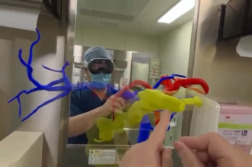BALTIMORE, MD (Ivanhoe Newswire) – Almost two million people will be told they have cancer this year. More than 200,000 of those will be considered a rare cancer. The rarer it is, the harder it is to find ways to not just treat it, but also get the right diagnosis. That’s why one woman is sharing her journey in hopes of giving patients like her a fighting chance to survive it.
Katie Coleman is all over social — sharing a very unique journey.
Katie says she was misdiagnosed and gaslighted over and over, explaining, “Everybody thought my symptoms were likely just from anxiety.”
After several trips to the ER, finally… a diagnosis of a rare cancer called metastatic oncocytoma.
“They’re a benign tumor that can grow on the kidney. What made my case so rare is the fact that it spread. There’s only single digit case reports of that documented kind of worldwide,” says Katie.
Ironically, through a social media support group, Katie found help at the National Cancer Institute.
“This is the only case I’ve ever seen or really heard of other than reading about in the medical literature from other countries,” says Oncologist Mark Ball, MD.
Dr. Ball and his team created a game plan just for Katie. They removed her kidney, and then ablated several lesions in her liver.
Dr. Ball says, “We hesitate to use the word cure until we have more and more time. So, the longer, the more time goes by the more we’re hopeful that this did the trick.”
Every day since her diagnosis Katie has posted in hopes that she can help someone else facing a rare diagnosis — she’s even written a book.
“I promised myself that if I made it to and through that surgery, I would dedicate the time that I was given to try to make things better for others.”
Katie’s book, too young for cancer, will be on sale in November. She is donating her entire book deal and proceeds to help fund research for rare cancers.
You can find info on the book and connections to all of her social media channels on her webpage at www.katiekickscancer.com/.
Contributors to this news report include: Marsha Lewis, Producer; Matt Goldschmidt, Videographer; Roque Correa, Editor.
To receive a free weekly e-mail on medical breakthroughs from Ivanhoe, sign up at: http://www.ivanhoe.com/ftk
Source:
MEDICAL BREAKTHROUGHS
RESEARCH SUMMARY
TITLE: KATIE KICKS CANCER WITH A FIRST
REPORT: MB #5400
BACKGROUND: Rare kidney cancers are those that occur infrequently and differ from the more common types of kidney cancer, such as renal cell carcinoma and renal sarcoma. They include various subtypes with distinct biological characteristics, clinical presentations, and treatment responses. According to the American Cancer Society, rare kidney cancers make up only 1% of all kidney cancers.
(Source: https://www.cancer.org/cancer/types/kidney-cancer/about/what-is-kidney-cancer.html)
DIAGNOSING: Signs and symptoms of any rare kidney cancer may or may not show up in the early stages, but they include, and are not limited to: blood in the urine, persistent back or side pain, abdominal bump, anemia, fatigue, and/or unexplained weight loss. Doctors can diagnose rare kidney cancer with a physical exam, an ultrasound, a CT scan, MRI scan, a urinalysis, or a biopsy. Risks factors of rare kidney cancer include: Hereditary conditions such as Von Hippel-Lindau disease, Birt-Hogg-Dubé syndrome, and hereditary leiomyomatosis and renal cell cancer (HLRCC) syndrome, Exposure to carcinogens, such as cigarette smoke and certain chemicals, Long-term dialysis, chronic kidney disease, and high blood pressure, being obese, having high blood pressure, and/or overusing pain medications.
(Source: https://www.cancercenter.com/cancer-types/kidney-cancer/types)
NEW TECHNOLOGY: Urologic Oncologist at the National Cancer Institute of Health, Mark Ball, MD, was the doctor that treated patient Katie Coleman of her rare kidney cancer, called metastatic oncocytoma. He used a unique method that was specifically designed for Katie – he removed her kidney and ablated lesions in her liver. Now, Katie is in remission and uses social media to bring awareness to rare kidney cancers.
(Source: Mark Ball, MD, Urologic Oncologist, National Cancer Institute of Health)
FOR MORE INFORMATION ON THIS REPORT, PLEASE CONTACT:
Nathan Gill
If this story or any other Ivanhoe story has impacted your life or prompted you or someone you know to seek or change treatments, please let us know by contacting Marjorie Bekaert Thomas at mthomas@ivanhoe.com




